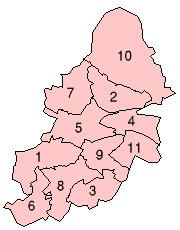Government of Birmingham
|
|
| Birmingham
| |

|
This page is about the Government of Birmingham, England.
| Contents |
Local Government
History
Most of Birmingham was historically a part of Warwickshire, though the modern city also includes villages and towns formerly in Staffordshire or Worcestershire.
Until the 1760s Birmingham was administered by manorial and parish officials, most of whom served on a part-time and honourary basis. By the 1760s the population growth of Birmingham made this system completely inadquate, and salaried officials were needed. In 1768 a body of "Commisioners of the Streets" was established who had powers to levy a rate for functions such as cleaning and street lighting. They were later given powers to provide policing and build public buildings.
The Reform Act of 1832 gave Birmingham its first representation in Parliament innitially with only two MP's but this has been gradually expanded.
Birmingham gained the status of a municipal borough in 1838 and gained its its first elected town council which took over the functions of the Street Comissioners. In 1889 it became a county borough (unitary authority) and a city. This remained unchanged until 1974 when Birmingham became a metropolitan district of the newly-created West Midlands county under the West Midlands County Council. The county council was abolished in 1986 and Birmingham effectively reverted to being a unitary authority although sharing some services with other authorities in the county.
City Council
Birmingham City Council is the largest local authority in the UK with, following a reorganisation of boundaries in June 2004, 120 councillors representing just under one million people, in 40 wards.
After the election of 10 June 2004, there is no overall control, with the 120 seats being divided between the Labour, (53 councillors), Conservative (39) and Liberal Democrat ("Lib-Dem", 28) parties.
There is a Conservative/ Lib-Dem coalition, with Conservative group leader Mike Whitby as Leader of the council and Lib-Dem group leader Paul Tilsley as Deputy Leader.
Joint services
The city council runs some services jointly with other authorities in the West Midlands county.
Birmingham is covered by the West Midlands Police and the West Midlands Fire Service. Public transport in Birmingham is overseen by the West Midlands Passenger Transport Executive.
Wards
Following the June 2004 reorganisation, Birmingham's wards are:
- Acocks Green
- Aston
- Bartley Green
- Billesley
- Bordesley Green
- Bournville
- Brandwood
- Edgbaston
- Erdington
- Hall Green
- Handsworth Wood
- Harborne
- Hodge Hill
- Kings Norton
- Kingstanding
- Ladywood
- Longbridge
- Lozells and East Handsworth
- Moseley and Kings Heath
- Nechells
- Northfield
- Oscott
- Perry Barr
- Quinton
- Selly Oak
- Shard End
- Sheldon
- Soho
- South Yardley
- Sparkbrook
- Springfield
- Stechford and Yardley North
- Stockland Green
- Sutton Four Oaks
- Sutton New Hall
- Sutton Trinity
- Sutton Vesey
- Tyburn
- Washwood Heath
- Weoley
Districts
From 5 April 2004, responsibility and budgets for a number of services were devolved to 11 district committees, as part of a growing trend in the UK to use area committees for large councils. These are:
- Edgbaston
- Erdington
- Hall Green
- Hodge Hill
- Ladywood
- Northfield
- Perry Barr
- Selly Oak
- Sparkbrook
- Sutton Coldfield
- Yardley
Each comprises three or four wards. They are not identical to the Parliamentary constituencies mentioned below, as the districts are composed of whole wards, whilst, following ward boundary changes in June 2004, the 11 constituencies split wards. However, the district boundaries have been drawn with the minimum change from the parliamentary boundaries in mind. They therefore maintain some rather undesirable qualities for service provision, notably a boundary bisecting King's Heath, the main centre for much of South Birmingham.
Parishes
Birmingham is nearly entirely unparished. Its only civil parish, New Frankley, was established in 2000 in an area transferred from Bromsgrove in 1995, which had previously been part of the Frankley parish.
National Government
Birmingham's eleven constituencies are represented in the House of Commons by one Conservative, one Liberal Democrat and nine Labour MPs.
| # | Constituency | MP | Party |
|---|---|---|---|
| 1 | Birmingham, Edgbaston | Gisela Stuart | Labour |
| 2 | Birmingham, Erdington | Siôn Simon | Labour |
| 3 | Birmingham, Hall Green | Stephen James McCabe | Labour |
| 4 | Birmingham, Hodge Hill | Liam Byrne | Labour |
| 5 | Birmingham, Ladywood | Clare Short | Labour |
| 6 | Birmingham, Northfield | Richard Burden | Labour |
| 7 | Birmingham, Perry Barr | Khalid Mahmood | Labour |
| 8 | Birmingham, Selly Oak | Dr Lynne Jones | Labour |
| 9 | Birmingham, Sparkbrook and Small Heath | Roger Godsiff | Labour |
| 10 | Sutton Coldfield | Andrew Mitchell | Conservative |
| 11 | Birmingham, Yardley | John Hemming | Lib-Dem |
External links
- Birmingham City Council (http://www.birmingham.gov.uk)
- District Committees (http://www.birmingham.gov.uk/devolution)

